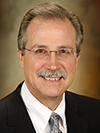That is what we do
 by Jed Delmore, MD —
by Jed Delmore, MD —
Certain experiences in medical school training stay with you forever. I’m not referring to the angina-producing, underwear-soiling tirades of an attending on morning rounds, but to inspiring experiences that mold you into the physician you have become.
Dr. Montague Lane was a larger-than-life medical oncologist at Methodist Hospital in Houston who was responsible for basic science lectures and clinical rounds as a professor of medicine and pharmacology at Baylor College of Medicine. The oncology service included third- and fourth-year medical students, resident physicians and oncology fellows.
The questions on rounds started with the least experienced and progressed to the most seasoned learners, all of whom hoped the person ahead of them got the question right. Dr. Lane was the most intimidating person in the hallway – and the most compassionate person in the patient’s room.
I mention all this as it applies to the current opioid abuse/misuse problem. The therapeutic tools available for cancer therapy in 1976 pale in comparison the options available today. What has not changed is our obligation as doctors to treat and control symptoms.
Now we return to Dr. Lane. Once out of the hospital room and back in the hallway, Dr. Lane’s questions were fairly consistent for each patient. “What can we fix and what can we treat?”
His point was to emphasize that we may not be able to fix or cure the cancer, heart disease or end-stage renal disease due to diabetes, but we should assure the patient that we can and will treat the symptoms and pain, because “that is what we do.”
As we work to develop a plan to address the opioid problems, which we may have contributed to but don’t hold the major responsibility for, we must not allow non-physicians/politicians/administrators to dictate how and when we prescribe narcotic analgesics. That is like being asked to fix a vase and not being allowed to use glue.
The Kansas Medical Society with the Kansas Hospital Association have established a task force with representation among all stakeholders to address the issue of opioid use as it applies to Kansas. MSSC members Drs. Joe Davison, Daniel Warren and Samer Antonios serve on that joint task force, representing our patients and us. Our governor has also created a multi-agency task force to study the issue, an effort headed by MSSC member Dr. Greg Lakin, who is KDHE’s chief medical officer.
It’s good to see this issue getting proper attention, but it can be difficult with all the news coverage to clearly understand the extent of the problem on a local level. That’s why, at the May 1 MSSC Members Meeting, we will have a panel discussion that includes Drs. Lakin, Davison and Warren.
I encourage all our members to attend and consider bringing a resident physician or medical student. It’s time to work on a plan so that they can also say, “That is what we do.”


